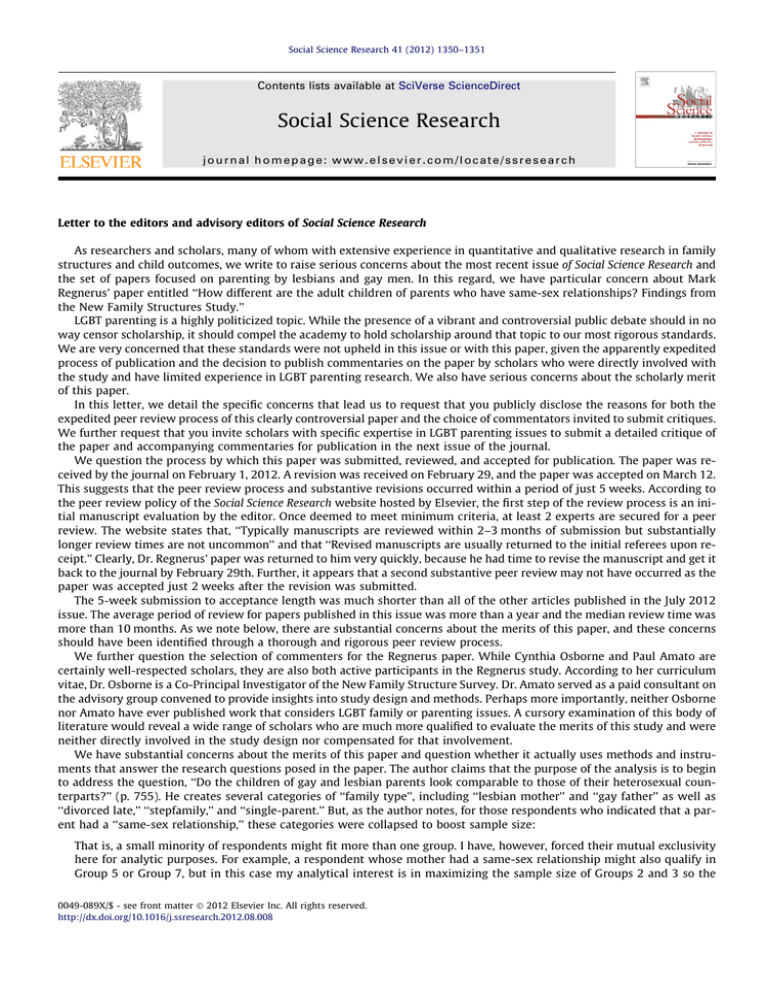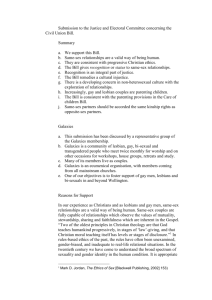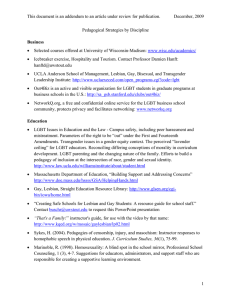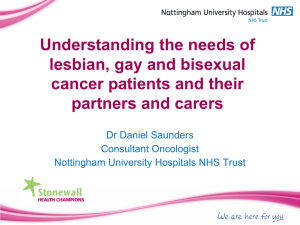
Social Science Research 41 (2012) 1350–1351
Contents lists available at SciVerse ScienceDirect
Social Science Research
journal homepage: www.elsevier.com/locate/ssresearch
Letter to the editors and advisory editors of Social Science Research
As researchers and scholars, many of whom with extensive experience in quantitative and qualitative research in family
structures and child outcomes, we write to raise serious concerns about the most recent issue of Social Science Research and
the set of papers focused on parenting by lesbians and gay men. In this regard, we have particular concern about Mark
Regnerus’ paper entitled ‘‘How different are the adult children of parents who have same-sex relationships? Findings from
the New Family Structures Study.’’
LGBT parenting is a highly politicized topic. While the presence of a vibrant and controversial public debate should in no
way censor scholarship, it should compel the academy to hold scholarship around that topic to our most rigorous standards.
We are very concerned that these standards were not upheld in this issue or with this paper, given the apparently expedited
process of publication and the decision to publish commentaries on the paper by scholars who were directly involved with
the study and have limited experience in LGBT parenting research. We also have serious concerns about the scholarly merit
of this paper.
In this letter, we detail the specific concerns that lead us to request that you publicly disclose the reasons for both the
expedited peer review process of this clearly controversial paper and the choice of commentators invited to submit critiques.
We further request that you invite scholars with specific expertise in LGBT parenting issues to submit a detailed critique of
the paper and accompanying commentaries for publication in the next issue of the journal.
We question the process by which this paper was submitted, reviewed, and accepted for publication. The paper was received by the journal on February 1, 2012. A revision was received on February 29, and the paper was accepted on March 12.
This suggests that the peer review process and substantive revisions occurred within a period of just 5 weeks. According to
the peer review policy of the Social Science Research website hosted by Elsevier, the first step of the review process is an initial manuscript evaluation by the editor. Once deemed to meet minimum criteria, at least 2 experts are secured for a peer
review. The website states that, ‘‘Typically manuscripts are reviewed within 2–3 months of submission but substantially
longer review times are not uncommon’’ and that ‘‘Revised manuscripts are usually returned to the initial referees upon receipt.’’ Clearly, Dr. Regnerus’ paper was returned to him very quickly, because he had time to revise the manuscript and get it
back to the journal by February 29th. Further, it appears that a second substantive peer review may not have occurred as the
paper was accepted just 2 weeks after the revision was submitted.
The 5-week submission to acceptance length was much shorter than all of the other articles published in the July 2012
issue. The average period of review for papers published in this issue was more than a year and the median review time was
more than 10 months. As we note below, there are substantial concerns about the merits of this paper, and these concerns
should have been identified through a thorough and rigorous peer review process.
We further question the selection of commenters for the Regnerus paper. While Cynthia Osborne and Paul Amato are
certainly well-respected scholars, they are also both active participants in the Regnerus study. According to her curriculum
vitae, Dr. Osborne is a Co-Principal Investigator of the New Family Structure Survey. Dr. Amato served as a paid consultant on
the advisory group convened to provide insights into study design and methods. Perhaps more importantly, neither Osborne
nor Amato have ever published work that considers LGBT family or parenting issues. A cursory examination of this body of
literature would reveal a wide range of scholars who are much more qualified to evaluate the merits of this study and were
neither directly involved in the study design nor compensated for that involvement.
We have substantial concerns about the merits of this paper and question whether it actually uses methods and instruments that answer the research questions posed in the paper. The author claims that the purpose of the analysis is to begin
to address the question, ‘‘Do the children of gay and lesbian parents look comparable to those of their heterosexual counterparts?’’ (p. 755). He creates several categories of ‘‘family type’’, including ‘‘lesbian mother’’ and ‘‘gay father’’ as well as
‘‘divorced late,’’ ‘‘stepfamily,’’ and ‘‘single-parent.’’ But, as the author notes, for those respondents who indicated that a parent had a ‘‘same-sex relationship,’’ these categories were collapsed to boost sample size:
That is, a small minority of respondents might fit more than one group. I have, however, forced their mutual exclusivity
here for analytic purposes. For example, a respondent whose mother had a same-sex relationship might also qualify in
Group 5 or Group 7, but in this case my analytical interest is in maximizing the sample size of Groups 2 and 3 so the
0049-089X/$ - see front matter Ó 2012 Elsevier Inc. All rights reserved.
http://dx.doi.org/10.1016/j.ssresearch.2012.08.008
Letter to the editor / Social Science Research 41 (2012) 1350–1351
1351
respondent would be placed in Group 2 (LMs). Since Group 3 (GFs) is the smallest and most difficult to locate randomly in
the population, its composition trumped that of others, even LMs. (There were 12 cases of respondents who reported both
a mother and a father having a same-sex relationship; all are analyzed here as GFs, after ancillary analyses revealed comparable exposure to both their mother and father).
By doing this, the author is unable to distinguish between the impact of having a parent who has had a continuous
same-sex relationship from the impact of having same-sex parents who broke-up from the impact of living in a samesex stepfamily from the impact of living with a single parent who may have dated a same-sex partner; each of these
groups are included in a single ‘‘lesbian mother’’ or ‘‘gay father’’ group depending on the gender of the parent who had
a same-sex relationship. Specifically, this paper fails to distinguish family structure and family instability. Thus, it fails
to distinguish, for children whose parents ever had a same-sex relationship experience, the associations due to family
structure from the associations due to family stability. However, he does attempt to distinguish family structure from
family instability for the children of different-sex parents by identifying children who lived in an intact biological
family. To make a group equivalent to the group he labels as having ‘‘lesbian’’ or ‘‘gay’’ parents, the author should have
grouped all other respondents together and included those who lived in an intact biological family with those who
ever experienced divorce, or whose parents ever had a different-sex romantic relationship. That seems absurd to family structure researchers, yet that type of grouping is exactly what he did with his ‘‘lesbian mother’’ and ‘‘gay father’’
groups.
It should be noted that the analyses also fail to distinguish family structure from family stability for single mothers; this
group included both continuously single mothers and those single mothers who had previously experienced a divorce.
The paper employs an unusual method to measure the sexual orientation of the respondents’ parents. Even if the analyses
had distinguished family stability from family structure, this paper and its accompanying study could not actually directly
examine the impact of having a gay or lesbian parent on child outcomes because the interpretation of the measurement of
parental sexual orientation is unclear. The author acknowledges as much when he states:
It is, however, very possible that the same-sex romantic relationships about which the respondents report were not
framed by those respondents as indicating their own (or their parent’s own) understanding of their parent as gay or lesbian or bisexual in sexual orientation. Indeed, this is more a study of the children of parents who have had (and in some
cases, are still in) same-sex relationships than it is one of children whose parents have self-identified or are ‘‘out’’ as gay
or lesbian or bisexual.
Respondents were asked whether their parents had ever had a same-sex relationship. The author then identifies
mothers and fathers as ‘‘lesbian’’ or ‘‘gay’’ without any substantiation of parental sexual orientation either by respondents or their parents. Given the author’s stated caveats, it is both inappropriate and factually incorrect for him to
refer to these parents as ‘‘gay’’ or ‘‘lesbian’’ throughout the paper.
We are very concerned about the academic integrity of the peer review process for this paper as well as its intellectual
merit. We question the decision of Social Science Research to publish the paper, and particularly, to publish it without an
extensive, rigorous peer review process and commentary from scholars with explicit expertise on LGBT family research.
The methodologies used in this paper and the interpretation of the findings are inappropriate. The publication of this paper
and the accompanying commentary calls the editorial process at Social Science Research, a well-regarded, highly cited social
science journal (ranking in the top 15% of Sociology journals by ISI), into serious question. We urge you to publicly disclose
the reasons for both the expedited peer review process of this clearly controversial paper and the choice of commentators
invited to submit critiques. We further request that you invite scholars with specific expertise in LGBT parenting issues to
submit a detailed critique of the paper and accompanying commentaries for publication in the next issue of the journal.
Gary J. Gates et al.
E-mail address: gates@law.ucla.edu
URL: http://familyinequality.files.wordpress.com/2012/08/ssr-gates-letter.pdf
Available online 20 August 2012




